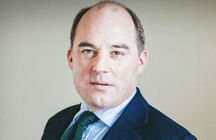Ben Wallace – 2022 Statement on Ukraine (9 March 2022)
The statement made by Ben Wallace, the Secretary of State for Defence, in the House of Commons on 9 March 2022.
With permission, Mr Speaker, I would like to update the House on the situation in Ukraine and Her Majesty’s Government’s support to the Government in Kyiv.
The situation on the ground is grave. As we can recall, on 24 February, forces of the Russian army, unprovoked, crossed into Ukraine’s sovereign territory. Along three main axes, Russian armour has attempted to occupy Ukraine. Its plan was to reach and encircle Kyiv, encircle Ukrainian forces near the border and invade from the south to link up with its forces via Mariupol.
Russian high command committed 65% of its entire land forces, which are indisputably in possession of overwhelming firepower and armour. It is estimated that at the start of the invasion they had between 110 and 120 battalion tactical groups dedicated to the task, compared with approximately 65 in Ukraine. Their missile stocks gave them even greater strength to reach Ukraine at distance. However, what they did not and still do not possess is the moral component so often needed for victory.
After 14 days of the war, according to the Ukrainian general staff, at 6 March, Russian casualties were assessed to include 285 tanks, 985 armoured fighting vehicles, 109 artillery systems, 50 multiple launch rocket systems, 44 aircraft, 48 helicopters and 11,000 soldiers, who have lost their lives needlessly. There are numerous reports of surrenders and desertions by the ever-growingly disillusioned Russian army. To be clear, those are Ukrainian figures; I have to caution the House that we have not verified them by defence intelligence or other means.
I can announce to the House our assessment that, of the initial Russian objectives, only one has been successfully achieved. While Russian forces are in control of Kherson, Melitopol and Berdyansk in southern Ukraine, they currently encircle the cities of Chernihiv, Sumy, Kharkiv and Mariupol but are not in control of them. In addition, their first day objective of targeting Ukrainian air defence has failed, preventing total air dominance. The Ukrainian armed forces have put up a strong defence while mobilising the whole population. President Putin’s arrogant assumption that he would be welcomed as a liberator has deservedly crumbled as fast as his troops’ morale.
For our part, the United Kingdom continues to play a leading role in supporting Ukraine. On 17 January, I announced to the House the Government’s intention to supply military aid to the Ukrainian armed forces. The aid took the form of body armour, helmets, boots, ear defenders, ration packs, rangefinders and communication equipment, and for the first time it also included weapons systems. The initial supply was to be 2,000 new light anti-tank weapons, small arms and ammunition.
In response to further acts of aggression by Russia, we have now increased that supply. I can update the House that, as of today, we have delivered 3,615 NLAWs and continue to deliver more. We will shortly be starting the delivery of a small consignment of anti-tank javelin missiles as well. I want to assure the House that everything we do is bound by the decision to supply defensive systems and is calibrated not to escalate to a strategic level.
Britain was the first European country to supply lethal aid. I was pleased that not long after a military aid donor conference I held on 25 February, many more countries decided to do the same. From right across Europe, the donations came. In particular, I want to highlight the Netherlands, Sweden, Finland, Denmark, Poland, Romania, the Baltic states, Belgium and Slovenia for their leadership, and we should not ignore the significance of the German Government joining us, in a change of stance, and donating such aid.
Donations are not enough; the delivery of aid to the frontline is just as important. Here, again, Britain is leading, because alongside Canada, the United States and Sweden, we have invested in building Ukrainian military capacity since 2015, and we find ourselves able to co-ordinate the delivery alongside our partners.
As the conflict intensifies, the Russians are changing their tactics, so the Ukrainians need to, too. We can all see the horrific devastation inflicted on civilian areas by Russian artillery and airstrikes, which have been indiscriminate and murderous. It is therefore vital that Ukraine maintains its ability to fly and to suppress Russian air attack. To date, the international community has donated more than 900 man-portable air defence missiles and thousands of anti-tank guided weapons of varying types, as well as various small arms. However, the capability needs strengthening, so in response to Ukrainian requests the Government have taken the decision to explore the donation of Starstreak high-velocity, man-portable anti-aircraft missiles. We believe that this system will remain within the definition of defensive weapons, but will allow the Ukrainian forces to better defend their skies. We shall also be increasing supplies of rations, medical equipment, and other non-lethal military aid.
As with any war, the civilian population is suffering horrendous hardships. According to the Ukrainian Minister of Education, 211 schools have been damaged or destroyed, and media footage shows Russian strikes hitting kindergartens. The Chernihiv regional administration reported that the Russian air force was employing FAB-500 unguided bombs against targets in the city, and according to Human Rights Watch, civilians in Mariupol have now been without water and power for almost a week. President Zelensky talked of children dying of thirst. Today the estimated number of Ukrainian civilians killed or injured stands at more than 1,000, but the true figure is expected to be much higher, and I am afraid that worse is likely to come. It is for that reason that the UK will increase its funding for Ukraine to £220 million, which includes £120 million of humanitarian aid. That will make the United Kingdom the single biggest bilateral humanitarian donor to Ukraine. We are also supporting humanitarian work with the Polish and Romanian Governments on the borders.
As I said in my last statement, we still believe that it is worth trying to build diplomatic pressure on Russia. This week, my good friend the Prime Minister met the Prime Ministers of Canada, the Netherlands and Poland. He also spoke to the leaders of France, Germany and the United States, and the Prime Ministers of Hungary, Slovakia and the Czech Republic. The Foreign Secretary is in Washington at the G7, and also attended the NATO Foreign Ministers meeting earlier this month. I myself met the Ukrainian Ambassador just this morning. President Putin should be and can be in no doubt that the international community is united against his actions. It remains strong, and will not back down.
As well as giving direct military support to Ukraine, we continue to bolster our contribution towards NATO’s collective security. NATO Defence Ministers will gather next week in Brussels to discuss the next steps. The UK is doing its bit in giving military support and reassurance to its allies. We are currently supplying significant air power to NATO, including increased air patrols, with both Typhoons and F-35s for NATO air policing. We have also deployed four additional Typhoons to Cyprus to patrol NATO’s eastern border, and have sent an additional 800 troops to Estonia. Over the last week, Apache and Chinook helicopters were involved in exercises in Estonia. Meanwhile, HMS Diamond has sailed to the eastern Mediterranean, HMS Northumberland is taking part in a northern deployment, and HMS Grimsby is in the Norwegian sea supporting NATO mine countermeasures.
On Monday HMS Prince of Wales, RFA Tidesurge and HMS Defender joined HMS Albion and RFA Mounts Bay for Exercise Cold Response, a multinational exercise off the coast of Norway, and HMS Richmond will be exercising with our joint expeditionary force. We have put over 1,000 more British troops on readiness to support humanitarian responses in the bordering countries. Britain’s contribution to NATO is significant and enduring. It is important at this time that, in order to maximise our reassurance and resilience effect, we co-ordinate through NATO and the Supreme Allied Commander Europe.
Few of us will not have been moved by President Zelensky’s speech yesterday. His people are fighting for their very survival. His country is united against this aggression, and it is indeed his country’s darkest hour. Yesterday I saw footage of a Russian armoured train, bristling with guns, heading towards Mariupol. A single brave Ukrainian woman ran to the train and shouted “Slava Ukraini”—unmoved, unintimidated by the guns. That woman’s bravery should inspire us all.
I know that many of our constituents, and our colleagues, are fearful of what will happen next. President Putin and the Kremlin continue to threaten countries that offer help to Ukraine. Their military campaign will, I am afraid, become more brutal and more indiscriminate, but it is my firm belief that our strength to stand up to such bullying comes from our alliances. As long as we stand united, both as a House and as the international community, the Kremlin’s threats cannot hurt us. We should take strength from the peoples right across Europe who are standing shoulder to shoulder to protect our values—our freedom, our tolerance, our democracy and our free press. That is our shield.


